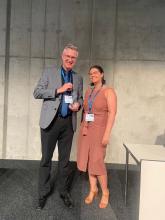The chemical industry is currently experiencing serious cutbacks, as it is dependent on favorable access to raw materials and energy. At the 14th European Congress of Chemical Engineering and 7th European Congress of Applied Biotechnology, Prof. Martin Bertau showed how the circular economy can help to overcome these cuts. The plenary lecture "Winds of change - why we have to leave trodden paths in raw material processing" received the CIT Award as a CIT Lecture of the scientific journal "Chemie Ingenieur Technik".
According to the presentation by the institute's director of technical chemistry, "the concept of recyclable chemistry represents a complete departure from the conventional." The term describes the totality of processes and methods for the production of chemical raw materials that are independent of their origin. It completely erases the boundaries between primary raw materials (mining) and secondary raw materials (recycling), which is elementary to establishing a true circular economy, the argument goes.
"By focusing on the product, regardless of the origin of the raw materials, both mining products and recycled materials are processed along a single process chain. In other words, even material that has already passed through one or more product cycles is inevitably regenerated to primary product quality because there is only one technology chain," explains Prof. Martin Bertau. "So we have true recycling where now we are just downcycling. Only the entry points may differ."
When implemented consistently, chemical engineering can largely meet planetary boundaries: Climate neutrality, zero-waste production, low CO2 footprint and no need for fossil raw materials, water conservation, use of renewable energy, and high energy and resource efficiency. "We need to make industrial chemical processes fit for the future," Bertau said. The good news: "We can already meet the requirements of the coming decades. The knowledge is in the drawers of universities," he says, calling on policymakers to lift this treasure.
